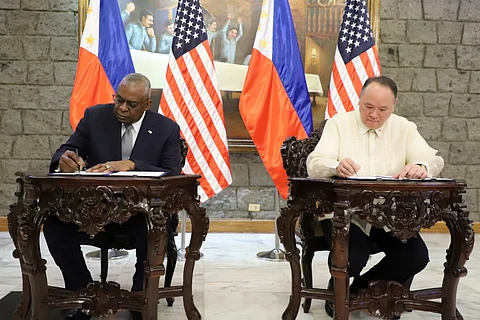
- NEWS
- the EDIT
- COMMENTARY
- BUSINESS
- LIFE
- SHOW
- ACTION
- GLOBAL GOALS
- SNAPS
- DYARYO TIRADA
- MORE

China is "paranoid" about the signing of a security agreement allowing the exchange of highly confidential military information between the Philippines and the United States.
This is how Defense Secretary Gilberto “Gibo” Teodoro Jr. described China’s opposition to the General Security of Military Information Agreement (GSOMIA), signed between Manila and Washington on 18 November at Camp Emilio Aguinaldo, Quezon City.
“If you weren’t paranoid, you wouldn’t comment about it, in so far as I’m concerned, because it is something bilateral between the United States and the Philippines. All of these actions — to me, prove the existence of some motive which is brought about by a closed political system,” Teodoro said in a media interview on Tuesday at Western Command headquarters in Puerto Princesa, Palawan.
“The political system where the external controls the internal political environment,” he added.
Shortly after the Philippines and the US finalized their GSOMIA, Chinese Foreign Ministry spokesperson Lin Jian emphasized that the only right choice for safeguarding national security as well as regional peace and stability is to uphold “good neighborliness and friendship.”
Lin Jian also stressed the need to “maintain strategic independence” amid territorial disputes between the Philippines and China in the West Philippine Sea (WPS).
“No military agreement, or defense and security cooperation, in whatever form, should target any third party or harm the interests of any third party. Nor should it undermine regional peace or exacerbate regional tensions,” Lin Jian said.
In response, Teodoro said the Philippines and the US are committed to upholding international laws.
“Insofar as the Philippines is concerned, in partnership with the United States, our main theme of cooperation here, aside from being treaty allies, stands for upholding international law and the fundamental values of freedom and democracy,” he said.
Teodoro also lamented China’s repeated narratives justifying its aggression in the WPS and its continued denial of Philippine access to its exclusive economic zone (EEZ).
“It’s the same story over and over again. They have been more aggressive in denying us access to our exclusive economic zone in the West Philippine Sea,” he said.
Teodoro noted China’s deployment of “pseudo-military vessels” disguised as coast guard and maritime militia ships in WPS areas.
“They have been very aggressive in their information operations against the Philippines,” he added.
In the same interview, US Department of Defense Secretary Lloyd Austin III described Beijing’s behavior in the South China Sea as “concerning.”
“They’ve used dangerous escalatory measures to enforce their expansive South China Sea maritime claims,” he said.
Austin reiterated the US' commitment to its bilateral ties with the Philippines despite China’s objections to the Mutual Defense Treaty (MDT).
“We remain committed to the treaty. We stand with the Philippines and we condemn dangerous actions by the PRC against lawful Philippine operations in the South China Sea. gain, this is concerning behavior,” he said.
